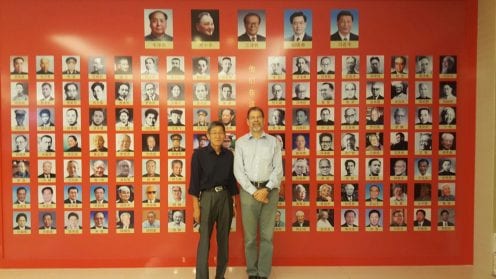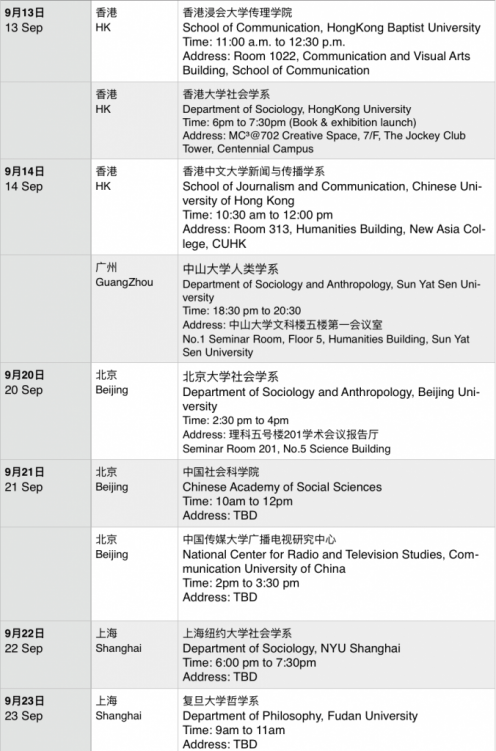UCL Press Meets Chinese Publishing Delegates from China Publishing Group
By ucyllsp, on 6 April 2017
On 22nd March I had the great pleasure of meeting a delegation of 15 Chinese publishers from the largest publisher in China, the China Publishing Group, and presented a two-hour session to them on academic publishing in the UK and, more specifically, the university-based open access publishing model forged by UCL Press.
CPG, which was ranked no.14 in the 2014 Top 50 Global Publishing Groups, has been in the Top 30 of Chinese Cultural Enterprises for six consecutive years, and owns 40 individual publishing companies and imprints which produce over 10,000 titles per year. Importantly, it concludes licensing agreements with overseas publishers for over 1,000 books and journals per year, and comprises China’s biggest publications import and export enterprise, importing and exporting over 200,000 titles every year. CPG also owns 28 overseas publishing houses and bookshops.
The publishers I met reflected the wide range of publishing that takes place in the CPG family – scholarly, children’s, poetry, encyclopedias, and art and architecture to name just a few. The delegates were in England as part of a three-week training programme during which they met publishers, wholesalers, PR agencies and others in the publishing industry, to gain greater insights into the possibilities for doing business with publishers in the UK, and their trip also included attendance at the London Book Fair, who had organized their training programme.
I was joined during the session by one of UCL Press’s authors, Dr Gabriel Moshenska, Senior Lecturer in the UCL Institute of Archaeology, whose textbook, Key Concepts in Public Archaeology, has just been published by UCL Press. Gabe explained from an author’s point of view why open access publishing is so important i.e. the ability to communicate his ideas to a wide global readership, and why open access textbooks in particular are increasingly important for supporting the student experience and for making UCL teaching resources available globally, thereby raising the profile of UCL teaching and research. We demonstrated UCL Press’s online publishing platform, which features scholarly functionalities such as highlighting, making notes, saving personalised copies of books, sharing and citation. The CPG publisher for fine art books was particularly interested in the subject of public archaeology, a field that was pioneered at UCL and has been taught here for twenty years. There is growing international interest in public archaeology in countries such as the US, Australia, Italy, Sweden and China. We were able to tell the delegates about UCL’s global standing, particularly in subjects such as archaeology, architecture and education.
The publishers asked a range of perceptive questions about the Press’s model, for example, could a particularly successful OA book raise an author’s profile to the extent that they decide to publish elsewhere with a commercial publisher, and how the endeavour is financed.
In China, open access does exist for journals but not yet for books. Print books are in any case sold at a very low price, between £2.50 and £3.50 typically, and, according to one of the publishers who works for CPG’s academic imprint, scholarly monographs can sell in relatively large numbers ie 4000-5000 copies, so the scholarly publishing model in China does not suffer from the same degree of problems as the Western one. One particular barrier in China to open access for monographs is a culture in which free things are not trusted to be of good quality. And as in the UK and US, publisher brand prestige is hugely important.
In order for UCL Press to make its books available in China in Chinese, it will need to arrange licensing deals between a Chinese publisher and the author, for the Chinese publisher to translate and sell the work in China, which is the usual way books are licensed to foreign-language publishers. UCL Press has had expressions of interest in some of its books from Chinese publishers and as our publishing programme continues to expand, this interest is likely to grow. While we would ideally like our books to be published open access around the world, we recognize that the OA model for books is not yet widely enough developed and therefore we accept that a commercial model for making the books available in other languages can be the only available route. This is with the notable exception of books in our social media series, Why We Post, which the WWP project has undertaken to translate into all eight languages of the project. These will be published by UCL Press as open access, with the exception perhaps of the two Chinese titles, Social Media in Industrial China and Social Media in Rural China, for which there is strong interest from Chinese publishers who are unlikely to agree to publication of a simultaneous OA Chinese version.
UCL Press will of course always make the English language version of our books available as open access to a global audience, something the publishers from CPG did not think would be a barrier to Chinese publication. All in all, it was a fascinating couple of hours exchanging ideas and information about different publishing models. The Beijing Book Fair beckons!
 Close
Close









